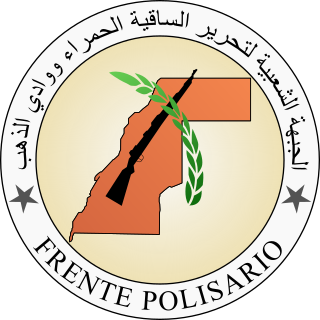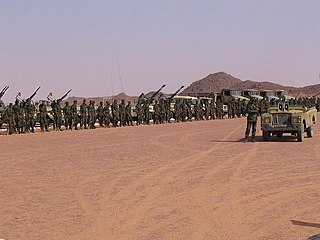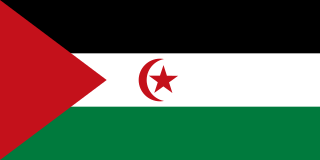
Western Sahara is a disputed territory on the northwest coast of Africa. About 20% of the territory is controlled by the Sahrawi Arab Democratic Republic (SADR); the remaining 80% is occupied and administered by neighboring Morocco. It has a surface area of 266,000 square kilometres (103,000 sq mi). It is the second most sparsely populated country in the world and most sparsely in Africa, mainly consisting of desert flatlands. The population is estimated at about 500,000, of which nearly 40% live in Morocco-controlled Laayoune, the largest city in Western Sahara.
The history of Western Sahara can be traced back to the times of Carthaginian explorer Hanno the Navigator in the 5th century BC. Though few historical records are left from that period, Western Sahara's modern history has its roots linked to some nomadic groups such as the Sanhaja group, and the introduction of Islam and the Arabic language at the end of the 8th century AD.

The politics of Western Sahara take place in a framework of an area claimed by both the partially recognized Sahrawi Arab Democratic Republic and the Kingdom of Morocco.

Western Sahara, formerly the Spanish colony of Spanish Sahara, is a disputed territory claimed by both the Kingdom of Morocco and the Popular Front for the Liberation of the Saguia el Hamra and Rio de Oro, which is an independence movement based in Tifariti and Bir Lehlou. The Annexation of Western Sahara by Morocco took place in two stages, in 1976 and 1979, and is considered illegal under international law.

The Polisario Front, Frente Polisario, Frelisario or simply Polisario, is a rebel Sahrawi nationalist liberation movement claiming Western Sahara.

Spanish Sahara, officially the Spanish Possessions in the Sahara from 1884 to 1958, then Province of the Sahara between 1958 and 1976, was the name used for the modern territory of Western Sahara when it was occupied and ruled by Spain between 1884 and 1976. It had been one of the most recent acquisitions, as well as one of the last remaining holdings, of the Spanish Empire, which had once extended from the Americas to the Spanish East Indies.

The Madrid Accords, formally the Declaration of Principles on Western Sahara, was a treaty between Spain, Morocco, and Mauritania setting out six principles which would end the Spanish presence in the territory of Spanish Sahara and arrange a temporary administration in the area pending a referendum.

Tiris al-Gharbiyya was the name for the area of Western Sahara under Mauritanian control between 1975 and 1979.
The Houston Agreement was the result of negotiations between the Polisario Front and Morocco on the organization of a referendum, which would constitute an expression of self-determination for the people of Western Sahara, possibly leading to full independence or integration within Morocco. The talks were conducted during 1997 in Houston, United States, under the auspices of United Nations representative James Baker, using the framework of the 1991 Settlement Plan. The agreement was supposed to lead to a referendum in 1998, after it had been prevented from taking place in 1992 as originally envisioned.

The Western Sahara conflict is an ongoing conflict between the Sahrawi Arab Democratic Republic/Polisario Front and the Kingdom of Morocco. The conflict originated from an insurgency by the Polisario Front against Spanish colonial forces from 1973 to 1975 and the subsequent Western Sahara War against Morocco between 1975 and 1991. Today the conflict is dominated by unarmed civil campaigns of the Polisario Front and their self-proclaimed SADR state to gain fully recognized independence for Western Sahara.

The politics of the Sahrawi Arab Democratic Republic refers to politics of the Polisario Front's proclaimed Sahrawi Arab Democratic Republic, a country in North Africa with limited recognition by other states, controlling parts of the Western Sahara region.

The Western Sahara Autonomy Proposal is an initiative proposed by Morocco in 2006 as a possible solution to the Western Sahara conflict. In 2006, the Moroccan Royal Advisory Council for Saharan Affairs (CORCAS) proposed a plan for the autonomy of Western Sahara and made visits to a number of countries to explain the proposal. The Spanish approach to regional autonomy has been named as a possible model for Western Saharan autonomy, mentioning specifically the cases of the Canary Islands, the Basque Country, Andalusia or Catalonia. The plan was presented to the UN Security Council in April 2007 and received the backing of the United States and France. This initiative constituted the main ground for the Moroccan proposal at Manhasset negotiations.

The Western Sahara War was an armed struggle between the Sahrawi indigenous Polisario Front and Morocco from 1975 to 1991, being the most significant phase of the Western Sahara conflict. The conflict erupted after the withdrawal of Spain from the Spanish Sahara in accordance with the Madrid Accords, by which it transferred administrative control of the territory to Morocco and Mauritania, but not sovereignty. In late 1975, the Moroccan government organized the Green March of some 350,000 Moroccan citizens, escorted by around 20,000 troops, who entered Western Sahara, trying to establish a Moroccan presence. While at first met with just minor resistance by the Polisario Front, Morocco later engaged a long period of guerrilla warfare with the Sahrawi nationalists. During the late 1970s, the Polisario Front, desiring to establish an independent state in the territory, attempted to fight both Mauritania and Morocco. In 1979, Mauritania withdrew from the conflict after signing a peace treaty with the Polisario Front. The war continued in low intensity throughout the 1980s, though Morocco made several attempts to take the upper hand in 1989–1991. A cease-fire agreement was finally reached between the Polisario Front and Morocco in September 1991. Some sources put the final death toll between 10,000 and 20,000 people.

Sahrawi nationality law is the law of the Sahrawi Arab Democratic Republic's (SADR) governing nationality and citizenship. The SADR is a partially recognized state which claims sovereignty over the entire territory of Western Sahara, but only administers part of it. The SADR also administers Sahrawi refugee camps.

The following outline is provided as an overview of and topical guide to the Sahrawi Arab Democratic Republic:

The Sahrawi Arab Democratic Republic, also known as the Sahrawi Republic and Western Sahara, is a partially recognized state, recognized by 46 UN member states and South Ossetia, located in the western Maghreb, which claims the non-self-governing territory of Western Sahara, but controls only the easternmost one-fifth of that territory. Between 1884 and 1975, Western Sahara was known as Spanish Sahara, a Spanish colony. The SADR is one of the two African states in which Spanish is a significant language, the other being Equatorial Guinea.
The Western Sahara peace process refers to the international efforts to resolve the Western Sahara conflict. The conflict has failed so far to result in permanent peace between Morocco and the Polisario Front. The standing issues of the peace process include Sahrawi refugees, and human rights in Western Sahara.

Sahrawi nationalism is a political ideology that seeks self-determination of the Sahrawi people, the indigenous population of Western Sahara. It has historically been represented by the Polisario Front. It came as a reaction against Spanish colonialist policies imposed from 1958 on, and subsequently in reaction to the Mauritanian and Moroccan invasions of 1975.

Sahrawi Arab Democratic Republic–Spain relations are the current and historical relations between the Sahrawi Arab Democratic Republic and Spain.

The 2020–2024 Western Saharan clashes, also called the Guerguerat crisis, Moroccan military intervention in Guerguerat or Second Western Sahara War, is an armed conflict between the Kingdom of Morocco and the self-proclaimed Sahrawi Arab Democratic Republic (SADR), represented at the United Nations by the Polisario Front, in the disputed region of Western Sahara. It was the latest escalation of an unresolved conflict over the region, which is largely occupied by Morocco, but 20–25% is administered by the SADR. The violence ended a ceasefire between the opposing sides that had held for 29 years in anticipation of a referendum of self-determination that would have settled the dispute. Despite the establishment of the United Nations Mission for the Referendum in Western Sahara in 1991, the referendum was never held.












